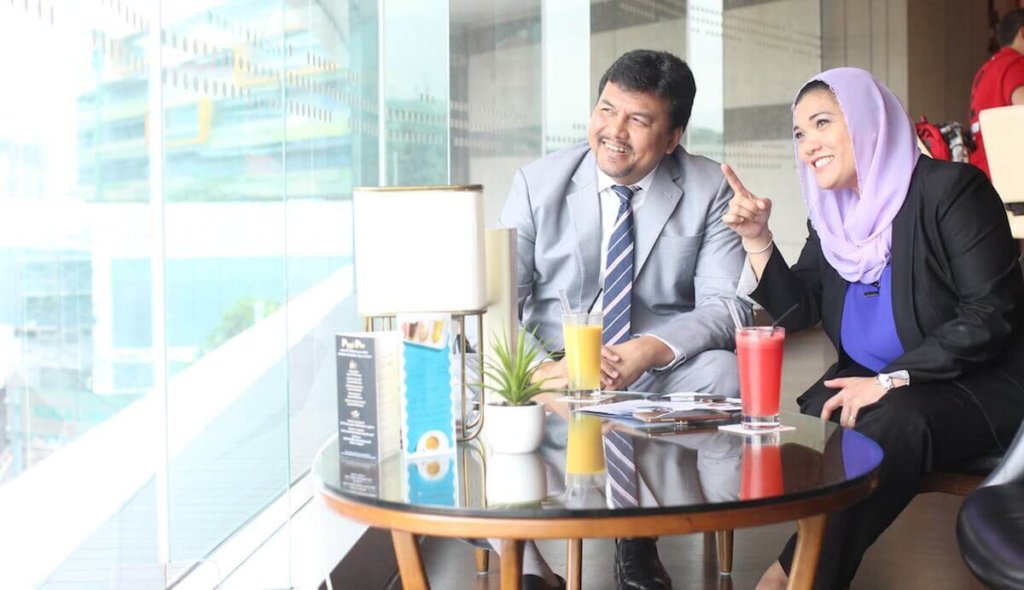Interview with Leilanie Mohd Nor and Mohar Yusof
Throughout much of Malaysia’s history, race and economic prospects have been closely intertwined. Perhaps at no time was the issue more evident than during the racial riots of 1969.
As a response to the civil unrest came the 1971 Malaysian New Economic Policy which sought to eradicate poverty amongst the Malaysian population through improvements in quality of life and by giving them greater access to the economic machinery. One of the many direct and indirect results of this twenty-year policy was an increase in Malaysian family-owned business that sprouted up.
Today a husband and wife team of university academics and business consultants seek to educate, guide, and advise these family owned businesses as they navigate the rocky waters of succession to the second and third generations. Leilanie Mohd Nor is the National Leader of Successful Transgenerational Entrepreneurship Practices (STEP) Malaysia based out of the Universiti Tun Abdul Razak in Kuala Lampur where she is on the faculty. Her husband, Mohar Yusof is the Family Business & Family Office Advisor and a professor at the university.
Tharawat Magazine sat down with Leilanie and Mohar to explore the challenges and opportunities that exist for family owned businesses in Malaysia.
Why did you start getting interested personally in the family business topic, what pushed you into this?
L: One day, the President & Vice Chancellor of our University, Universiti Tun Abdul Razak, came back from a trip to Hong Kong. He gave me a newspaper clipping on the richest man in Hong Kong, a family business founder. About the same time, our university decided to embark on the Successful Transgenerational Entrepreneurship Practices (STEP) project. In 2008 I went for my first STEP meeting in Hong Kong and began my PhD on family business. It was very much the push by the Vice Chancellor to look into family businesses as a factor that contributes to the economy that got us where we are today.
Did you both grow up in business families?
L: My mother started a business in the 80s. She used to import furniture from the Philippines, India, and Pakistan. She started when I was 12 years old so I was very much involved. We had about five outlets located in Kuala Lumpur, Shah Alam and Seremban. There were challenges and hardships but at the same time it gave me an understanding of how hard it is to run a business. As we talk to owners of family businesses today, we understand what they go through and the challenges they face.
M: In my case, my father started a business in the 80s. At that time there were not many Malay businessmen. After I graduated in 1992 with my bachelor degree, I joined the family business. My father didn’t talk much about family matters so we mostly talked about business. I learned from trial and error even though my father was there, he allowed me to make mistakes. I learned the value of failure. So when I talk now to family businesses, especially those in the second and third generation, we try to encourage them to communicate with their parents.
Is that lack of communication a common problem that you see? Does it stem from conflict or other aspects?
L: I think it’s a combination of conflict and communication. Perhaps being Malaysians, the openness to discuss real issues becomes a challenge because we are always trying to respect the other person and trying not to hurt anyone. We are afraid to say the wrong thing and because of that, there’s a lack of communication which breeds conflict and then it spirals down from there.
Is there an advantage right now to being a family-owned company in Malaysia or is it something that is rather difficult to manage?
L: There are a lot of programs which are carried out by the government that support entrepreneurial activities. I must say they are really supporting entrepreneurship but they are mostly targeting the younger generation. They are pushing for technology-based startups and are probably trying to find the next Mark Zuckerberg. Most of the family businesses are in their second generation and this is a critical moment where something needs to be done to ensure their sustainability.
M: It’s not the government that’s looking for ways to help the family businesses but it’s the private sector. There are some private initiatives that are taking place among family businesses themselves who are concerned with the future and want to start a dialogue.
Do you feel working in a family owned-business is something that fits the culture?
L: I think so. People tend to start with families because perhaps that is the most convenient, when you have support from family members. Funding often comes from parents, co-founders are often siblings.
Can you tell us why your family owned businesses tend to be in the second and third generation in Malaysia?
L: The governments initiative in the 70s did a lot to spur the economy to encourage more people to start businesses. So there were a lot of young entrepreneurs in the 70s and 80s and today many of these businesses are in their second generation.
M: Especially those owned by the Malays. The Malays are probably a little bit ahead of the Indians in terms of the age of their family businesses. The Chinese owned family businesses started earlier because the Chinese immigration to British Malaya was encouraged by the British for labour in the mines in the early 1900s.
Today, we know that the majority of SMEs are family-owned. We can also see that of the listed companies in the stock market; more than half are family businesses. Unfortunately, many family SMEs do not survive, especially those that are founded in the first generation by siblings.
Do family businesses see themselves at an advantage in Malaysian society?
M: I think that a lot of businesses do not see the advantages of being family-owned. And I guess that is because of the lack of knowledge on business governance, family governance, and succession. Even bankers and investors do not see the uniqueness of family businesses.
L: Perhaps an advantage for the family businesses now is the fact that they are closely-knit. As a culture, we are very collective rather than individualistic so it is a good fit. We tend to work together to make things happen. I think our closeness, our respect for elders, that is an advantage because the younger generation feel they are responsible to take on something from their parents and take it forward.
M: I agree with Leilanie, I think that even though we are multi-racial, but when it comes to values, these family-owned businesses tend to be the same regardless of races. Caring, integrity, they want to be sustainable, to remain in the family and so I think if we can get everyone to come together, that will bring about a lot of opportunities.
Tell us a little about your research. How are you developing the family business activities at Universiti Tun Abdul Razak?
L: When I did my PhD it was on the decision-making process in creating new ventures for the second generation. In doing that I then delved into communication, values, and trust because that seems to be coming up a lot in the context of family businesses.
M: Together we have been doing a lot of studies on family values, especially with the STEP project. The other area that I’m looking at is the succession planning, family governance, and wealth management. We have also launched a dedicated website familybusiness.my which serves as a knowledge resource for all things family business in Malaysia. Our family office advisory company, BinaPavo, is also growing.
At the university, we have been talking about having a Center for Entrepreneurship and Family Business. At the moment, we are the only two speaking at the seminars and conferences so we also need to figure out our own succession, I guess. We are trying to get the young academics to be involved and get more PhD students to come and work with us.
L: We have designed a program with a concentration in family business and we hope sometime in the near future that we will be running it for our students.

